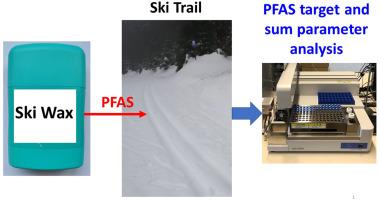Per- and polyfluoroalkyl substances (PFAS) in Ski waxes and snow from cross-country skiing in Germany - Comparative study of sum parameter and target analysis
IF 5.4
Q2 ENGINEERING, ENVIRONMENTAL
引用次数: 0
Abstract
Per- and polyfluoroalkyl substances (PFAS) are often environmentally exposed via discharge through human consumer products, such as ski waxes. In our study we analyzed various ski waxes from the 1980s and 2020s, to determine both the sum parameter values total fluorine (TF), extractable organically bound fluorine (EOF), hydrolysable organically bound fluorine (HOF) as well as targeted PFAS analysis. This showed that modern high-performance waxes contain up to 6 % TF, but also PFAS-free labelled ski waxes contain traces of PFAS with EOF/HOF values in the low mg kg-1 range. With the ban of all fluorine-based waxes with the start of the 2023/2024 winter season this will probably change soon. Moreover, we applied our analysis methods to snow samples from a frequently used cross country ski trail (Kammloipe) in the Ore Mountain region in Germany, assessing the potential PFAS entry/discharge through ski waxes. Melted snow samples from different spots were analyzed by the adsorbable organically bound fluorine (AOF) sum parameter and PFAS target analysis and confirmed the abrasion of the ski waxes into the snow. Moreover, on a PFAS hotspot also soil samples were analyzed, which indicate that PFAS from the ski waxes adsorb after snow melting into the soil.

德国越野滑雪雪蜡和雪中的全氟和多氟烷基物质 (PFAS) - 总参数和目标分析比较研究
全氟和多氟烷基物质(PFAS)经常通过人类消费品(如滑雪蜡)排放到环境中。在我们的研究中,我们分析了 20 世纪 80 年代和 20 世纪 20 年代的各种滑雪蜡,确定了总氟(TF)、可萃取有机结合氟(EOF)、可水解有机结合氟(HOF)的总参数值,并进行了有针对性的 PFAS 分析。结果表明,现代高性能蜡的 TF 含量高达 6%,但无 PFAS 标记的滑雪蜡也含有微量 PFAS,EOF/HOF 值在低 mg kg-1 范围内。随着 2023/2024 年冬季开始禁止使用所有含氟雪蜡,这种情况可能很快就会改变。此外,我们还将我们的分析方法应用于德国矿石山地区一条经常使用的越野滑雪道(Kammloipe)上的雪样,以评估通过滑雪蜡进入/排放 PFAS 的可能性。通过可吸附有机结合氟(AOF)总参数和 PFAS 目标分析,对不同地点的融化雪样进行了分析,结果证实滑雪蜡磨损后会进入雪中。此外,还对一个 PFAS 热点的土壤样本进行了分析,结果表明滑雪蜡中的 PFAS 会在雪融化后吸附到土壤中。
本文章由计算机程序翻译,如有差异,请以英文原文为准。
求助全文
约1分钟内获得全文
求助全文
来源期刊

Journal of hazardous materials advances
Environmental Engineering
CiteScore
4.80
自引率
0.00%
发文量
0
审稿时长
50 days
 求助内容:
求助内容: 应助结果提醒方式:
应助结果提醒方式:


